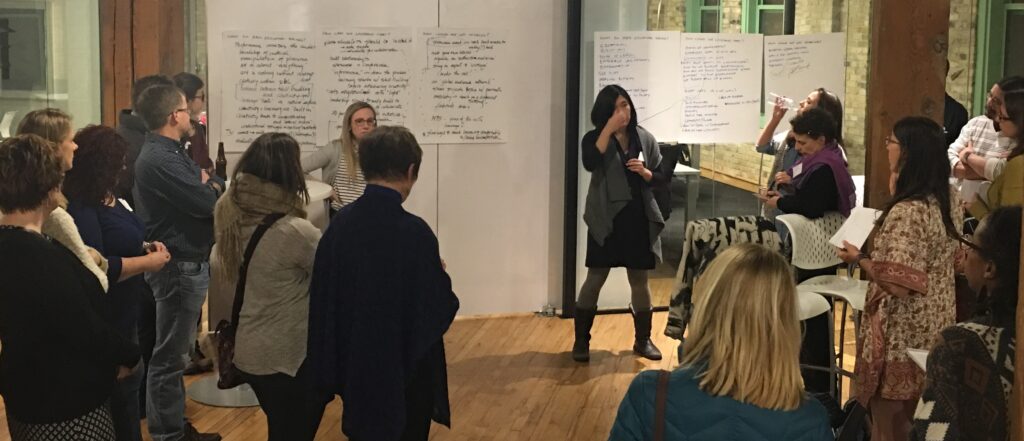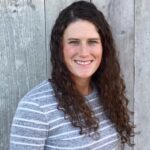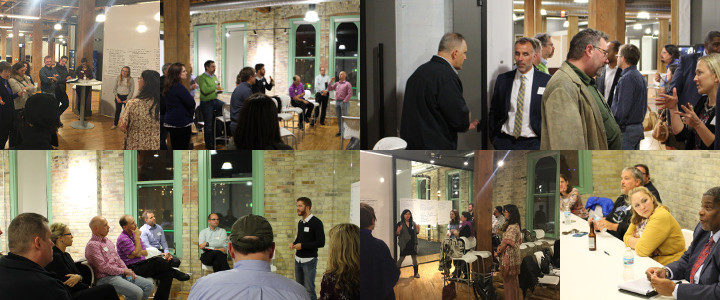The demands of curriculum and pull of old routines work together to sap energy for our loftier ambitions for students.
In the cold of winter, how do we press on?

Season 8/Collab Lab 59
The focus for December was Support for Authentic Work. Even with that support, habit and curriculum goals tempt us to ask less of students and less of ourselves. How do we recharge the passion to do more for students and press on towards the spring we know is coming?
As always, you’ll be joined by peers and collaborators from K-12 higher education, industry, and the nonprofit community. If you work with or know of a student who would like to join the discussion please extend the invitation.
Agenda
| 5:30 to 6:00 pm | Grab something to eat, meet some interesting, passionate people |
| 6:00 to 6:15 pm | Welcome and introductions |
| 6:15 to 8:00 pm | Let’s talk through some ideas |
| 8:00 to 8:30 pm | Wrap up and next steps |
Food and non-alcoholic beverages will be provided. There is no charge for participation but space is limited!
Featured Participants
Among others, you’ll have a chance to talk with:
PJ Dever — Executive Director for Playworks in Wisconsin
 PJ has worked in education for over 13 years with the majority of that work in Milwaukee schools. He has spent time working with students directly, as coach for educators, and a program director. Playworks’ mission is to improve the health and well-being of children by increasing opportunities for physical activity and safe, meaningful play. PJ & his team coaches youth, school staff, and out-of-school-time professionals to create great recesses, youth leadership opportunities, and infuse play into their curriculum.
PJ has worked in education for over 13 years with the majority of that work in Milwaukee schools. He has spent time working with students directly, as coach for educators, and a program director. Playworks’ mission is to improve the health and well-being of children by increasing opportunities for physical activity and safe, meaningful play. PJ & his team coaches youth, school staff, and out-of-school-time professionals to create great recesses, youth leadership opportunities, and infuse play into their curriculum.
Lana M. Minshew — Assistant Professor, Director of the Human-Centered Design Lab at the Medical College of Wisconsin
 Dr. Minshew also holds a faculty appointment in the Department of Clinical Sciences at the MCW Pharmacy School. She is a learning scientist, design thinker, educator, and researcher whose
Dr. Minshew also holds a faculty appointment in the Department of Clinical Sciences at the MCW Pharmacy School. She is a learning scientist, design thinker, educator, and researcher whose
work explores the relationships between educational theory, teaching practices, design thinking, and learning and cognition in health professions education.
Nina Johnston — Program Manager of the Human-Centered Design Lab at the Medical College of Wisconsin
 Nina is a design thinker, entrepreneur, and educator. She is a University Innovation Fellow through the d.school at Stanford University and received a Curriculum Innovation Grant and Fellowship through the Lubar Entrepreneurship Center at the University of Wisconsin Milwaukee, where she is a former lecturer. In her free time, Nina loves to read, refinish furniture, garden, and learn new creative skills.
Nina is a design thinker, entrepreneur, and educator. She is a University Innovation Fellow through the d.school at Stanford University and received a Curriculum Innovation Grant and Fellowship through the Lubar Entrepreneurship Center at the University of Wisconsin Milwaukee, where she is a former lecturer. In her free time, Nina loves to read, refinish furniture, garden, and learn new creative skills.
Shannon Smyth — US Soccer Coach Educator, Youth Technical Director
 In her role as a Youth Director at North Shore United Soccer Club, you will find Shannon on the field working with both youth and high-performance players ages 3-23 years old. For the past 10 years, she has worked for the US Soccer Federation in the Coaching Education department to help implement methodologies and curriculums created to promote “free play.” Through a holistic approach, coaches are taught to provide a reality-based and experiential learning environment, yielding both wins and losses and how to handle both!
In her role as a Youth Director at North Shore United Soccer Club, you will find Shannon on the field working with both youth and high-performance players ages 3-23 years old. For the past 10 years, she has worked for the US Soccer Federation in the Coaching Education department to help implement methodologies and curriculums created to promote “free play.” Through a holistic approach, coaches are taught to provide a reality-based and experiential learning environment, yielding both wins and losses and how to handle both!


 REDgen is an advocate for mental health and well being of all youth. REDgen was formed out of a duty of care. They foster active community conversations around what it means to live a balanced life with healthy definitions of success.
REDgen is an advocate for mental health and well being of all youth. REDgen was formed out of a duty of care. They foster active community conversations around what it means to live a balanced life with healthy definitions of success. Susan Lubar Solvang is President and Founder of Growing Minds, whose mission is to create safe and trusting relationships in the classroom and within the school community, setting the stage for better learning, using SEL tools, primarily mindful awareness practices. Growing Minds currently is focusing on Professional Development such that educators might learn to increase self-awareness of their emotional patterns, choose their responses intentionally, and learn to quiet the emotional ripples of moment-to- moment classroom life rather than creating more waves.
Susan Lubar Solvang is President and Founder of Growing Minds, whose mission is to create safe and trusting relationships in the classroom and within the school community, setting the stage for better learning, using SEL tools, primarily mindful awareness practices. Growing Minds currently is focusing on Professional Development such that educators might learn to increase self-awareness of their emotional patterns, choose their responses intentionally, and learn to quiet the emotional ripples of moment-to- moment classroom life rather than creating more waves.
